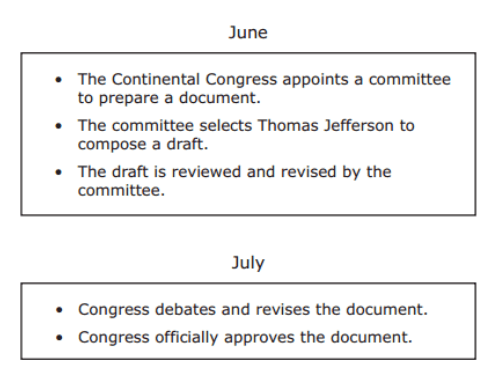
Declaring Independence
Quiz by Catherine Chesser
Feel free to use or edit a copy
includes Teacher and Student dashboards
Measures 4 skills from
Track each student's skills and progress in your Mastery dashboards
- edit the questions
- save a copy for later
- start a class game
- automatically assign follow-up activities based on students’ scores
- assign as homework
- share a link with colleagues
- print as a bubble sheet
- Q1
This sequence of events resulted in the adoption of the
Declaration of Independence
Bill of Rights
Treaty of Paris
Articles of Confederation
30s8.1.A: Social Studies - History - Q2
Which of these is a grievance from the Declaration of Independence?
Colonists born in America were prohibited from holding elected office
Colonists were forced to quarter troops in their homes
Colonists were required to serve a year in their colony's militia
Colonists were not eligible to be officers in the British Army
60s8.15.C: Social Studies - Government - Q3
Which excerpt from the Declaration of Independence best explains why the colonists were unhappy with about their lack of representation in Parliament?
"He has refused his Assent to laws the most wholesome and necessary for the public good."
"He has refused to pass laws for the accommodations of large districts of people."
"For transporting us beyond seas to be tried for pretended offenses."
"For imposing Taxes on us without our consent."
60s8.15.C: Social Studies - Government - Q4
Which description is an example of an unalienable right from the Declaration of Independence?
Equality- people's education should be equal in every state
Wealth- people's salaries should be dependent on their skills
Happiness- people can do lawful things that they enjoy
Patriotism- people are free to join any of the Armed forces
60s8.19.A: Social Studies - Citizenship - Q5
The rights listed in this table were
established by a series of Supreme Court decisions
defined by President George Washington in his Farewell Address
defined by Thomas Jefferson in the Declaration of Independence
established by the ratification of the US Constitution
60s8.19.A: Social Studies - Citizenship - Q6
In this excerpt, the authors of the Virginia Declaration of Rights are describing rights they consider-
protected under religious doctrine
defined by the courts
natural and possessed at birth
granted to citizens by the government
60s8.19.A: Social Studies - Citizenship - Q7
The rights above were-
defined by President George Washington in his Farewell Address
established by the ratification of the U.S. Constitution
defined by Thomas Jefferson in the Declaration of Independence
established by a series of Supreme Court decisions
60s8.19.A: Social Studies - Citizenship - Q8
This excerpt refers to rights that people-
earn by demonstrating loyalty to their government
receive by becoming citizens of a country
are granted after enlistment in the military
have as a result of being human
60s8.19.A: Social Studies - Citizenship - Q9
John Hancock was one of the Founding Fathers committed to liberty. How did he demonstrate his commitment?
By organizing Committees of Correspondence
By serving as Commander in Chief in the Continental Army
By writing the Articles of Confederation
By signing the Declaration of Independence
60s8.20.B: Social Studies - Citizenship - Q10
According to the Declaration of Independence, the American colonists had the right to break away from England because England had-
violated the colonists' natural rights
limited religious freedom in the colonies
imposed taxes unequally among the colonists
established the policy of mercantilism
60s8.19.A: Social Studies - Citizenship - Q11
The events in the table led to the
writing of the Declaration of Independence
nomination of George Washington as Commander in Chief of the Continental Army
ratification of the US Constitution
actions of farmers in the Whiskey Rebellion
60s8.1.A: Social Studies - History
